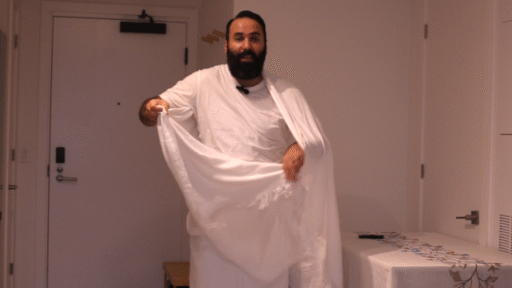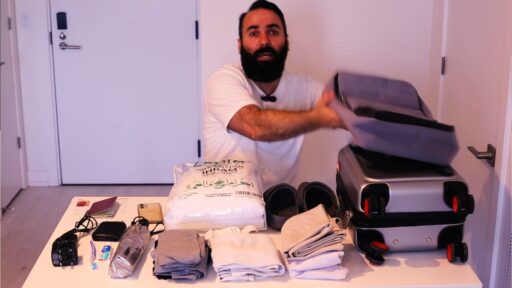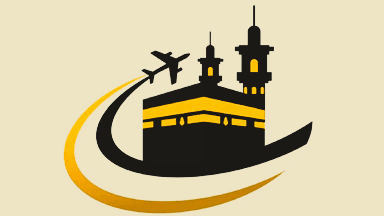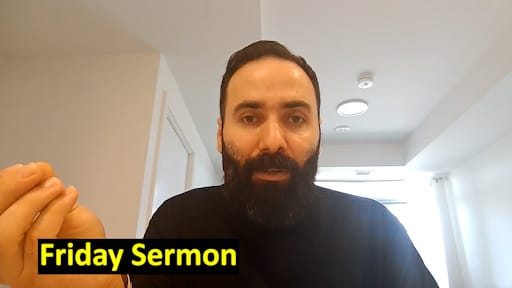Category: Sermons
My 2025 Hajj Travel Checklist
Hajj 2025 – Maps, Itinerary and Travel Guide
Is Bank Interest Prohibited in the Quran?
Praise be to God! There is no other god except God.
In Sura 3, verse 130, God prohibits us to engage in what is called “riba”. Let me give you an example what “riba” is. Let’s say that I live in the 15th century, in one of the medieval kingdoms, and I go to a friend, and I tell him that I need 100 gold coins as a loan for a year. He says, “Yes, you can have them, but at the end of the year you have to return 107 gold coins” Now, this is “riba”, prohibited interest – and it literarily means “increase”, and in this case we can see that my friend increased the number of gold coins which I have to return to him compared to what he gave me. And this is prohibited in the Quran.
Now, let’s take another example. Let’s say that I don’t live in the 15th century, but I live today in a democratic country, in Canada for example, and instead of going to my friend, I go to the bank to get a loan of 100,000 dollars, and the bank tells me. “OK, but at the end of the year, you have to return 107,000 dollars.” Now, the question is, “Is this also riba?” Before we answer that, let’s first list the differences between these two examples:
| Example 1 | Example 2 |
| In a kingdom | In a democracy |
| Loan from a human being | Loan from a bank (organisation) |
| Loan in gold coins | Loan in fiat money (paper money which is not backed by gold or silver) |
Now, do these three differences mean that the second example is not an example of ribba (prohibited interest), or is it still prohibited interest (riba)? Let’s analyze it.
So, as we can see, the second example happens in a democracy. But what does it mean to live in a democracy. Democracy in Greek means, “people rule”. So, in a democracy, we do not serve the government, like you do in a kingdom (where you serve the king). In a democracy, the government serves us, which means that the decisions of the government are ultimately a shared responsibility of us, the people in that country. Now, in democracies of today, on behalf of the people, the parliament creates a central bank, which prints money. So, we the people, in a democracy have ordered our servants, the state, more specifically, the central bank, to print money. And guess what, the central bank, as ordered by the parliament, which represents us, distributes that money through other banks by giving it to them as a loan with interest. So, effectively, we the people in democracies have charged interest on the banks first, before they did it to us. And in addition, we the people, listening to our naive economists have authorized the states to print about 2, 3 or 4% of money more than it is needed every year, which they call “inflation”, and this additional printing of money out of thin air is technically stealing from those who have the money – the banks in this case- and giving it to those who borrowed the money, the borrowers. So, we have effectively charged interest on the banks, before they did it to us. You as an individual, and I might have not wanted to do it, but we live in a society which does it on our behalf, and when we use the money, we are implicitly agreeing to it. If you don’t like it, don’t use the money. Go to a country which doesn’t use money. There is no such country today. And if you use the money, you are part of the system, and you have effectively charged interest on the banks first. Maybe not intentionally, but that does not change the fact that it happened under your watch, being one of the rulers in a democracy. Of course, because for you as a submitter, it was unintentional and unavoidable, God will forgive you for this unwanted situation, as I explain in another video titled “The Global Forced Behaviour”. But the fact is, we effectively did charge interest on the banks first.
Now, when we go to get loans from banks, the banks make sure that they charge us a higher interest then we charged them so that they can make a profit. However, at least part of it, part of their interest, as you can see is just the cancelation of our interest on them. So, that part is not really true interest. It’s just the cancelation of your interest. So, because we unfairly took from them, if they also take from us up to that same amount, that is fair, and just. The Quran says, “an eye for an eye” and that’s allowed. But, as I said, the banks actually charge us more than what we charged them. So, what about that additional portion? Is that portion prohibited interest? Now that additional portion consists of two sub-portions:
The first sub-portion of the interest, even though it is called interest, it is effectively a fee which the bank charges, not for the loan, but for the services it provides connected with that loan. See, in the first example of how it worked in the past, where you went to a friend to get a loan, you would be doing all the work- you go to his home, you might or might not find him, so you might have to go to 5 friends before one of them actually has the gold coins, and maybe that money might be available, but maybe he needs it, so he can not give it to you. In that case, you are going through all the work, and the risk , and the inconvenience, and your friend is not providing you any additional service except for the loan. But, imagine if that friend said, let me actually open an office close to you, and hire some employees, and make sure that they stay there all day for you, only so that when you need a loan once in a while, we are there to serve you. That service would cost. You didn’t just get a loan, you got the loan and a service, the convenience of finding it whenever you need it, the technology involved to make it easier for you, through online services, cards and things like that. It’s the same when you order ice cream at a restaurant, for example. It is more expensive then when you buy it from the shop. It’s because you are not only getting the ice-cream. You are also getting the service. They put it nicely on the table for you. They’ll wash the ice cream bowl for you, afterwards. All of that service, of course, costs. People are staying away from their families, so they can be at your service. So, a portion of the interest which banks charge is not interest at all. It’s a service fee for the costs which they have to go through to serve you.
Now, the last portion of interest, the portion which is neither interest cancellation, neither a service fee, that portion is true prohibited interest – riba.
Now, the question is, how big of a portion is that? How much of the so-called interest which the bank charges you is actual prohibited interest, riba? And thankfully, it is easy to calculate, because banks get almost all their revenue from interest. Their total interest is pretty much their revenue, and their total expenses are all for services and the cancelation of interest which they had to do. So, this means that to calculate the remaining prohibited interest after service fees and cancelation of interest, all we have to do is calculate the remaining revenue after expenses. And if you are an accountant, you know that revenue minus expenses equals profit. So, the profit of the bank is exactly the prohibited portion of interest, the riba. So, when it comes to banks, not everything they charge you is riba (prohibited interest). Only their profit portion is “riba” (prohibited interest). And how much is that? Well, on average, the owners of banks have a profit margin of about 15% after taxes and inflation adjustments. So, only about 15% of the interest which the bank charges you is actually riba, the interest which is prohibited in the Quran. This means that if someone says that bank interest is prohibited in the Quran, they are about 85% wrong. And in the future, they will be even more wrong, because true business profits will gradually go down close to 0% just before the End of the World, but that’s another issue. But today, in 2025, bank interest is about 85% allowed according to the Quran, and about 15% prohibited.
Now, the question is. Should we avoid bank loans completely, just because only 15% of that deal is prohibited? And we can not separate the allowed portion from the prohibited portion, because they come together within the same loan. Well, we have two choices here. We can avoid bank loans, or we can decide to use them, and then atone for the prohibited portion through Penalty Zakat. And this is an option which is allowed in the Quran. In Sura 9, verses 102 and 103 tell us that if someone engages in mixed deeds, which include both good and sin them, then we should compensate for the sinful portion with charity, which I have labeled “Penalty Zakat”, because it is obligatory charity as penalty for your sinful portion of the deed. Now, knowing that bank interest is about 15% sinful, in another video I explain the details why we have to pay 7.5% of the sinful portion. So, 7.5% of 15% is about 1%. So, if you work in a bank, you have to give 1% of your income as Penalty Zakat, unless the owner of the bank gave it, but that’s very unlikely, so you have to give it. And if you own stocks of a bank, you have to give 1% of the profit unless the employees of the ban gave it, but that’s very unlikely, so you have to give it. But, if you just take a loan from a bank, you were already financially penalized by the bank through the slightly higher interest rate than you deserved to be charged, so you don’t need to pay penalty zakat for loans which you get from a bank.
However, just because it is permissible to get a loan from a bank, that doesn’t mean that you should. Just because something is not a sin, that doesn’t make it a smart decision. So, let me give you a friendly tip on how to be smart with loans. There are two types of loans: Consumption loans and investment loans. Consumption loans are for example, a loan to cover your wedding expenses, or a loan to go on vacation, or a loan to refurnish your kitchen, or a loan to buy a bigger house, because it just looks better, or a loan to get the newest PlayStation, or a loan to buy the more expensive car than you have the money for because it just looks better. These are consumption loans. Investment loans are loans for a new business, materials for your business, or to buy a basic car because you need it for work, which makes it an investment in some ways, because it enables you to earn money at work. So, if you want to be smart about loans, avoid consumption loans, and take investment loans, when you have a very good investment idea, of course.
Mortgages are between consumption and investment loans, because they are essentially a consumption loan, where the investment component is just as big, because it enables you to escape out of the situation of paying rent.
Now, credit cards are generally consumption loans, so when you have to use them because they make transactions easier, always make sure to pay them as early as possible, before the interest kicks in. One of the best ways banks take advantage of greedy and financially stupid people is through credit cards, because they have among the highest interest rates.
Now, in a democratic country, with free markets, banks compete against each other to offer the lowest interest rates on investment loans, and the investors are only willing to take those loans, if their interest rates are lower than what the expected return on investment would be. This means that in in true democracies, average bank interest rates are forced to be lower than the average return on investment. And the economy of a truly democratic country has never grown more than about 20% per year. You can only get that rate of growth in a non-democratic country, or a country which just came out of devastating war, which is not a democracy either. So, because in practice, it has never happened for a truly democratic economy to grow faster than 20%, then having bank loans with a higher interest rate than about 20% can only happen in a country which is practically not a democracy. And in that environment the interest rates are prohibited, because as we said in the beginning, for interest rates not to be prohibited, they have to happen in a democracy, through banks (not through people), and with fiat money (not with gold and silver).
Now, if you get a loan from an actual person, not a bank, then all interest is riba (prohibited interest). However, because we use fiat money (paper money), which has an unfair inflation attached to it, because the government keeps stealing it’s value by about 2 to 3% every year on average, then you are allowed to adjust for that inflation during that period. And if there is deflation, which is very rare, you can also adjust for deflation. Think of it like this. If a person loaned 100 sheep to his friend. Of course, he should return 100 sheep back. Any other number would be prohibited interest, “riba”. However, if while he held the sheep, he starved the sheep so much so that now they are 10% thinner. He can not come and say that because he received 100 sheep and he returned 100 sheep, that is fair. No, it’s not fair. Look at the sheep. They look like goats. You either bring the sheep as healthy as they were, or if you returned them 10% thinner, then the fair thing to do is to return 110 sheep. And the same with money. Inflation makes the money thinner, with less value, just like in the case with thinner sheep. So, it’s unfair if you don’t take inflation into account, for any loan which extends one year or longer, where inflation matters. And this has nothing to do with ribba. You are just making it fair. The same real value for the same real value.
Friday Sermon by: Alban Fejza, Online Congregation Director
Who was Rashad Khalifa?
The Official Biography
Early Life
Born in Egypt in 1935, Rashad Khalifa grew up and studied in Egypt, and later emigrated to the United States, where he earned a Ph.D. in biochemistry. Khalifa became a naturalized U.S. citizen and settled in Tucson, Arizona.
The Discovery of the Mathematical Miracle of the Quran
Being dissatisfied with how the English translations of the Quran of that time did not manage to properly transmit the monotheistic essence of the Arabic Quran, Rashad Khalifa decided to translate the Quran from Arabic to English mainly for local consumption and his family. After translating the first Sura, he faced the challenge of translating the first verse of the second Sura. This verse only contains three mysterious letters “Alef, Laam, Meem”. Since the revelation of the Quran, for 14 centuries, the scholars did not know the meaning of these mysterious letters, they left them untranslated in English. Rashad had decided not to go further with the translation unless he understands what those mysterious letters mean first.
So he refocused his efforts into decoding the meaning of these mysterious letters, which are called Quranic Initials. He decided to put the whole Quran in the computer to see if there are any patterns which these Quranic Initials follow. Gradually, a mathematical pattern emerged, based on number 19. Eventually, the evidence piled so much that he realized that he had discovered a superhuman mathematical miracle of the Quran, which he published in 1974. He gained popularity in the Muslim World, where his discovery was published in several magazines, and a couple of books of popular Muslim preachers.
Quran alone doctrine
Realizing that from all the religious books which the Muslims use, only the Quran had this superhuman mathematical composition, this led Rashad Khalifa to conclude that the only religious book we can be sure to have been preserved, and guaranteed by God to be protected is the Quran, and therefore all the other religious books, including the Hadith books, which are commonly used in the Muslim World, are not fully reliable. In addition, given that the Quran itself says that the Quran is complete in truth and justice, and fully detailed in religious matters, this makes the Hadith books religiously unnecessary. This led Rashad to embrace the “Quran alone” doctrine, declaring that only the Quran should be used as an authoritative book for religious conclusions.
Messengership
Having adopted a Quran alone stance, Rashad Khalifa soon realized that the Quran (when read alone without reliance on outside sources like Hadith) does not actually claim that God will keep the End of the World completely hidden from humans. The Quran only says that the End of the World will be kept hidden from the disbelievers, but regarding the believers, it says that it will be kept “almost hidden”, not fully hidden, and even then, it is talking about keeping it mostly hidden from the believers before Muhammad, and during the time of Muhammad, but the Quran never says that it will be hidden from the believers after Muhammad. This realization motivated him to investigate when the End of the World will come, and soon enough, God let him discover in the Quran when the End of the World will come. This discovery happened in 1980, and he published it in his book, “The Computer Speaks”. This discovery automatically meant that Rashad Khalifa must be God’s messenger based on verse 27 of Sura 72 of the Quran which says that God reveals specific events from the future only to a messenger which he chooses. So, since the year 1980, the moment when he discovered the End of the World, Rashad Khalifa became aware that he was chosen by God to be the Messenger of the Covenant which is mentioned in Sura 3, verse 81. However, he did not inform the people about it until eight years later, in 1988. One of the reasons why he was reluctant to inform the public about this is because he was aware that the Muslim World believed that Muhammad was the last messenger based on their misunderstanding of verse 40 in Sura 33 which says that Muhammad was the final prophet. However, as Rashad was fully aware, the words “messenger (rasul)” and “prophet (nabi)” are two different words in the Arabic Quran and Rashad Khalifa never claimed to be a prophet like Muhammad was, or like Abraham was, or like Moses was, or like Jesus was. Rashad Khalifa only claimed to be a messenger, without being a prophet, which is what Peter, John, and James were, according to the Bible. It’s worth noting that after Jesus left this world, the disciples of Jesus, like Peter, John, and James became messengers, as the Bible calls them later after Jesus.
So there is a difference between someone like Jesus who was both a messenger and a prophet, and those who were only messengers like Peter, John and James. Similarly, there is a difference between Muhammad who was both a messenger and a prophet, and Rashad Khalifa who was only a messenger. And the difference between prophets and messengers is also confirmed in the Quran by the fact that the Quran says that prophets are given scriptures (books) from God, while messengers only confirm existing scriptures, existing books, which have been revealed through prophets. And in agreement with this, Rashad Khalifa’s role was to confirm the existing Quran, and prove mathematically to the enlightened modern scientific world that the Quran is indeed a book from God, as proven by it’s discovered superhuman mathematical composition.
Central Doctrine
The central doctrine of what Rashad Khalifa preached is to worship God alone, and to reject all idol worship, even if those idols might be Muhammad, or Jesus, or Mary, or the Saints. This agrees with what the Quran says that every messenger should preach. In Sura 21, verse 25, we are told that God and the heavenly society never sent any messenger except with the inspiration, “There is no god except God; you shall worship God alone”.
Martyrdom
Rashad Khalifa’s preaching enraged many Muhammedan religious leaders who were subconsciously afraid that his increasing fame would take away from the fame of their favorite prophet, prophet Muhammad. On the contrary, Rashad Khalifa agreed with everything that prophet Muhammad preached – the Quran. Nevertheless, the hatred towards Rashad Khalifa drove a Mohammedan named Glen Francis to travel all the way to Tucson, Arizona to plan Rashad’s assassination. He pretended to join the Congregation where Rashad preached, so that he can analyze the layout of the building for potential sneaky ways to commit his premeditated crime. He was using a fake name to make it more difficult to find him after the assassination. On the dawn of January 31, 1990, Glen Francis stabbed Rashad Khalifa 29 times, and by God’s leave, Rashad Khalifa joined thousands of other martyrs who were martyred for their beliefs striving in the cause of God throughout history. They are alive at their Lord, even though we can not see it from down here on earth.
Aftermath
After Rashad, those who believed him organized through the next messenger, Alban Fejza. They call themselves “the submitters” which simply means the “Muslims” in Arabic, and they follow the only religion accepted by God in the Quran called “submission”. The submitters are destined to prevail over all other religious groups, in this world and the next one, as predicted in the Quran.
To learn more about the submitters or to join them in worshiping God alone, and be part of the ultimate victory, click here.
For more information:
List of Articles About the Messenger of the Covenant
Join us to listen to our online Friday meetings every Friday.
A Message to Quranists
Friday Sermon by: Alban Fejza, Online Congregation Director
For more information:
Cooperate in Righteousness But Not in Sin
Join us to listen to our online Friday meetings every Friday.
Hating Other Religious Groups
Friday Sermon by: Alban Fejza, Online Congregation Director
For more information:
Cooperate in Righteousness But Not in Sin
Join us to listen to our online Friday meetings every Friday.
Jesus – How overestimated!? How underestimated!?
Friday Sermon by: Alban Fejza, Online Congregation Director
For more information:
Why Don’t Christian’s Pray Five Times a Day While Muslims Do?
Join us to listen to our online Friday meetings every Friday.
THE SUBMITTERS
Friday Sermon by: Alban Fejza, Online Congregation Director
For more information:
Join us to listen to our online Friday meetings every Friday.
Are there Three Prayers or Five Prayers in the Quran
Friday Sermon by: Alban Fejza, Online Congregation Director
For more information:
Reconstructing the Muslim Prayer Completely from the Quran
Abraham: Original Messenger of Islam
Join us to listen to our online Friday meetings every Friday.










